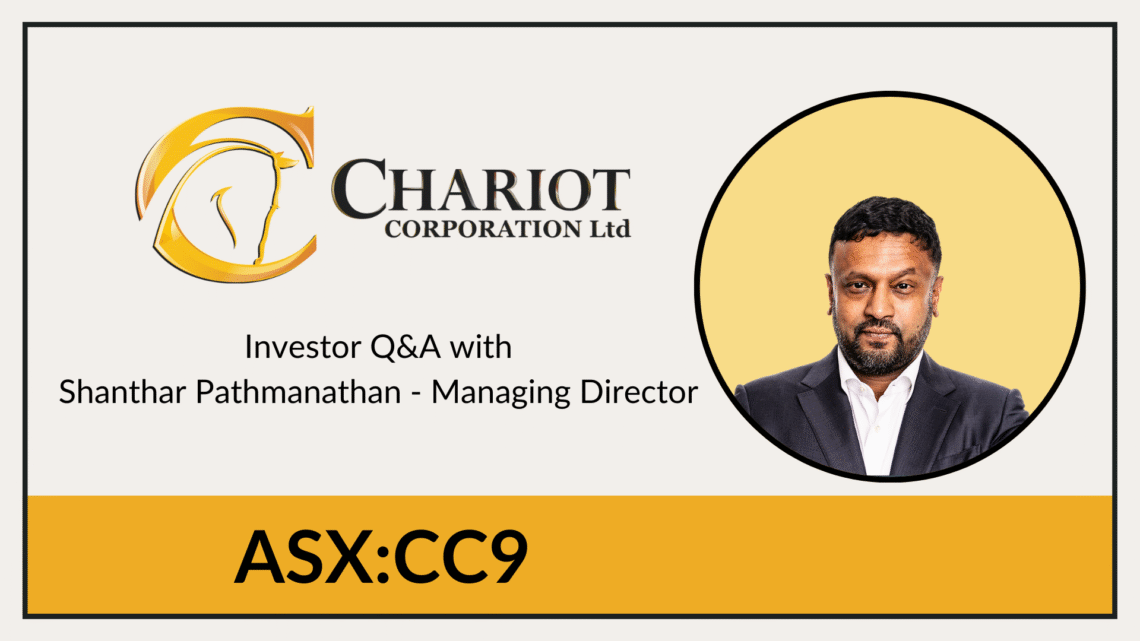
Chariot Corporation (ASX:CC9) sets structured course toward near term Nigerian lithium production
November 25, 2025Chariot Corporation’s Executive Chairman and Managing Director, Shanthar Pathmanathan, has provided a detailed overview of the Company’s binding agreement to establish small scale mining (SSM) across its Nigerian lithium projects.
The agreement allows Chariot and its local partner Continental to transition existing artisanal activity into a regulated operating framework that can support near term production while still advancing the larger scale exploration strategy across the Fonlo, Gbugbu, Iganna and Saki project clusters.
The commercial potential of these assets is already supported by a proven sales history.
As the Company notes:
“Artisanal miners at the Nigerian projects have been selling hand picked and hand processed lithium ore to Chinese buyers since 2021, demonstrating product demand and presenting a near term revenue potential for an SSM business.”
With this background, the new agreement gives Chariot a clear operational pathway that pairs early production opportunities with long term discovery ambitions.
The following Q&A with Shanthar outlines how the small scale mining program will be implemented, how risks are managed and how the approach fits with the Company’s broader exploration strategy.
What does the small scale mining agreement mean for near term production at the Nigerian projects?
The agreement provides the structure needed to move from informal artisanal activity into a coordinated small scale mining operation that meets regulatory and community expectations.
It establishes a clear division of responsibilities, with Continental overseeing the on ground mining and logistics while Chariot manages financing, offtake discussions and compliance.
This formalisation is a significant milestone, as reflected by the Company’s own framing of the agreement:
“The agreement formalises the parties’ commitments to rapidly establish SSM operations in a manner consistent with Nigerian mining regulations and community expectations.”
Because the program draws on an existing history of ore sales, it provides a realistic pathway to early revenue.
At the same time, it does not interrupt or delay the broader exploration programs across the four project clusters.
Instead, it adds a complementary near term component that works alongside the longer term goal of identifying substantial lithium resources.
How will the three phase plan help de risk the small scale mining operation?
The three phase plan has been designed to progressively remove uncertainty and ensure that operational decisions are guided by detailed technical work.
The first phase focuses on mapping, sampling and limited drilling to delineate near surface pegmatite zones and establish a localised JORC compliant resource that can underpin early mine planning.
The second phase involves sending ore samples for metallurgical testing, which will determine the most suitable processing method and expected recoveries for spodumene concentrate, while also evaluating the potential for by product recovery such as tantalum or tin.
This information enables the design of a processing flowsheet that reflects the characteristics of the actual material.
The third phase assesses available processing routes by examining newly constructed third party spodumene concentrate facilities in Nigeria and comparing the logistics and tolling costs of using those plants against the cost of installing a modular onsite processing unit.
As a result, the Company is able to select the most efficient and commercially beneficial path while avoiding unnecessary capital expenditure.
Through this stepped structure, Chariot enters each phase with more certainty than the last, resulting in a well informed and increasingly de risked development plan.
What level of buyer interest is there for lithium from these projects and how does this support funding?
The Nigerian projects already have an established commercial footprint, given the history of artisanal sales to Chinese buyers.
Building on that, Chariot has progressed into advanced discussions with several reputable international commodity buyers who are evaluating future offtake opportunities for ore or concentrate reflecting the strong demand for lithium in the region.
As the Company has stated publicly:
“Chariot has already entered advanced discussions with several reputable international commodity buyers regarding future offtake of lithium ore or concentrate from the Nigerian projects.”
If any of these discussions transition into binding agreements, they can directly support the financing of the small scale mining program.
Offtake arrangements may be structured to include components such as prepayment or other commercial terms that can reduce the need for shareholder dilution while enabling Chariot to fund the three phases of work.
How does the small scale mining plan fit with the larger exploration strategy across the Nigerian portfolio?
The small scale mining program is structured to operate in parallel with the Company’s wider exploration efforts and does not replace or override the long term strategy.
While the near term operation can generate early revenue and valuable operational experience, Chariot remains focused on systematically exploring the four project clusters, which together span approximately two hundred and fifty four square kilometres.
Exploration programs involving high resolution geophysics, geochemical soil sampling and targeted drilling will continue to advance beyond the artisanal zones, with the aim of identifying substantial lithium resources.
The agreement makes clear that small scale mining will only continue on a project by project basis while it remains feasible and profitable, and it will always remain secondary to the larger scale development pipeline.
This approach ensures that early production supports rather than slows the Company’s progression toward discovering one or more major lithium resource areas.
What are the key economic terms of the small scale mining arrangement and how will profits be shared?
The agreement outlines a balanced economic structure that recognises capital contributions, operational management and ownership interests.
Chariot may choose to provide a working capital loan of up to five hundred thousand United States dollars to support the establishment and operation of the small scale mining business.
Continental will receive an operator fee equal to ten percent of the half yearly net profit, although this is only payable when the operation is profitable.
After the operator fee is paid and after funding an agreed reserve, any remaining net profit will first repay any amounts advanced by Chariot under the working capital loan.
Once those amounts are repaid, further profit will be shared according to ownership interests, with Chariot currently holding 66.667 percent and Continental holding 33.333 percent.
This structure ensures that both parties are compensated fairly and that the agreement remains aligned with the Company’s long term development priorities.
To reinforce the strategic positioning of the program, the Company states:
“The SSM project is expected to deliver early revenue and strategic offtake partnerships, positioning Chariot and Continental as first movers in Nigeria’s emerging lithium sector.”
Progress toward early production and strategic growth
The small scale mining agreement marks a decisive step forward for Chariot Corporation as it works to capture near term production opportunities in an improving pricing environment while maintaining momentum across its broader Nigerian exploration portfolio.
By pairing a structured three phase development plan with established buyer interest and a clearly defined economic framework, the Company has created a pathway that supports early revenue generation without compromising its long term discovery ambitions.
Shanthar emphasises that the insights and cash flow potential from small scale mining will complement the systematic exploration programs underway across the Fonlo, Gbugbu, Iganna and Saki project clusters.
Chariot looks forward to updating shareholders as Phase 1 begins and as further exploration progress is made across the wider Nigerian asset base.
Please note the following valuable information before using this website.
Independent Research
Market Open Australia is intended to be used only for educational and informative purposes, and any information on this website should not be taken as investment advice or guidance. It is important to conduct your own research before making any investment decisions, which should be based on your own investment needs and personal circumstances. Any investment decisions based on information contained on this website should be taken in line with independent financial advice from a qualified professional or should be independently researched and verified.


